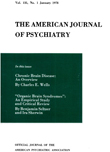Physiological Studies of the Hyperkinetic Child: I
Abstract
The authors conducted a three-week controlled, double-blind (methylphenidate-placebo) study of 31 hyperkinetic boys. Response to treatment was judged on the basis of improvement in pretreatment and posttreatment teacher ratings. Pretreatment measures indicated a high arousal state in those children who obtained a poor clinical response to methylphenidate. Changes in indicators of arousal suggested a greater physiological effect from methylphenidate treatment in the low-arousal (good clinical response) group. The authors' data suggest that genetic factors may play a major role in the etiology of this disorder; however, they stress the need for further research.
Access content
To read the fulltext, please use one of the options below to sign in or purchase access.- Personal login
- Institutional Login
- Sign in via OpenAthens
- Register for access
-
Please login/register if you wish to pair your device and check access availability.
Not a subscriber?
PsychiatryOnline subscription options offer access to the DSM-5 library, books, journals, CME, and patient resources. This all-in-one virtual library provides psychiatrists and mental health professionals with key resources for diagnosis, treatment, research, and professional development.
Need more help? PsychiatryOnline Customer Service may be reached by emailing [email protected] or by calling 800-368-5777 (in the U.S.) or 703-907-7322 (outside the U.S.).



